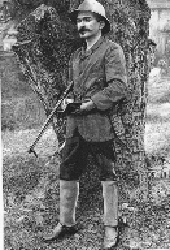Travel Reference
In-Depth Information
Figure 7.4.
Henri Coudreau: intrepid explorer and French colonialist.
By invoking the principle of
uti possedetis
, and the flight from slavery, Coudreau
coupled his colonialism to utopian Cunani, a maroon society, a place that could be one
of the “schools for a future socialism” complete with the charms of a recovered Eden:
“Cunani, noble river on whose banks Brazilian slaves in flight from their masters came
to find their freedom.” Here in this village would rise “the city of the future.”
95
Coudreau'spointwasthattheCunanians“neverlikedBrazil(thisisexplainedbytheir
previous status as slaves) and are very much in favor of France. Their republic
avant la
lettre
has existed for twenty-five years, they have sent petitions to the French govern-
ment four times requesting administrators. In the meantime, England has tried to estab-
lishanavalstationthere,andtheUSsentawarshiptostudythehydrology.. . .Portugal
sent emissaries there that tried to set up a principality that would be secretly supported
by the house of Bragança. But the Cunanians want either to be French or to be free. . . .
One more Republic is on the World Map!”
96
Coudreau continued his exposition of regional development by focusing on polytech-
nic schools embracing both native knowledge and European practical sciences. Ahead
of his time, Coudreau viewed the region as especially important for extractive goods of
rubber, cacau, and Brazil nuts; in short, he viewed Cunani as an economic powerhouse,
not even counting the gold in the alluvium. Coudreau ended his treatise with “The cur-
rent leaders and all the population are disposed to attach Cunani to France.” His final
comments extol with high praises the graces, caresses, and kindness of Indian women.
Speaking of the broader existential exhaustion of his voyages, he yearned to live in the
ingly, his wife Odile began to travel with him and was there when he contracted fever
and died in 1899 on the Trombetas River, a place famous both for its malaria and for its
maroon settlements. Odile Coudreau later became a celebrated
exploratrice
in her own
right and continued her expeditions until 1903.

Search WWH ::

Custom Search